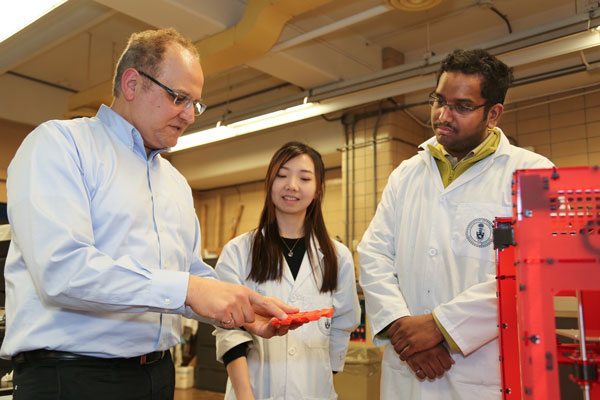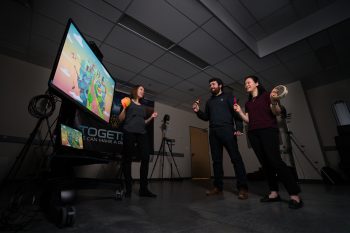External partnerships are a cornerstone of U of T Engineering — the Faculty collaborates with more than 300 external companies and organizations each year collaborative research institutes, student-led capstone projects, Professional Experience Year internships and other initiatives. Now, these connections are driving a series of consortia that aim to becomes engines of growth for the Canadian economy.
Today, the federal government announced the projects selected for its Innovation Superclusters Initiative, which will invest up to $950 million between 2017 and 2022 to support business-led innovation superclusters. As with existing superclusters such as Silicon Valley or Boston’s biotech hub, these dense concentrations of businesses, post-secondary institutions and related organizations will benefit from a strong brand and competitive advantage that translates into global recognition and impact.
“Our researchers are well-known for developing solutions to pressing global challenges, and experienced in working with industry to bring their innovations to market,” said Ramin Farnood, Vice-Dean, Research at U of T Engineering. “These superclusters will catalyze existing connections and create new ones, enhancing our ability to attract and train the best minds from around the world in key areas.”
Of the superclusters announced today, U of T Engineering is involved in two:
Next Generation Manufacturing Canada
Led by Toronto’s MaRS Discovery District and Waterloo’s Communitech Corporation, this supercluster brings together more than 100 partner organizations to position Canadian manufacturers as the ultimate tech integrators.
The products of the future — including electric and/or autonomous vehicles, wearable electronics and advanced biomedical devices — will require manufacturers to adopt new solutions that scale production, speed adoption and improve efficiency. Big data, intelligent machines and advanced materials can all contribute to improving the capabilities and competitiveness of Canada’s strong manufacturing sector.
U of T Engineering is home to world-leading facilities and expertise in these areas, including:
- The Toronto Institute of Advanced Manufacturing (TIAM), which leads innovation, research and education in advanced materials (nanomaterials, multifunctional composites, optoelectronics), advanced processes and systems (additive manufacturing, nanostructuring) and knowledge-based manufacturing (predictive models, data-driven supply chains.) It draws on the expertise and facilities available in other multidisciplinary institutes, such as the Ontario Centre for the Characterization of Advanced Materials and the Centre for Advanced Coating Technologies. Undergraduate students interested in becoming involved with TIAM can choose to enroll in the optional minor in Advanced Manufacturing. Launched in in the fall of 2017, this initiative will prepare the engineering leaders who will guide industry through the coming changes.
- The Institute for Robotics and Mechatronics brings together more than 50 principal investigators from across U of T to create the next generation of intelligent and autonomous machines, from drones that could improve delivery of goods to smarter robots designed for the factory floor. This expertise is also leveraged in the optional Robotics & Mechatronics minor for undergraduate students, which trains future engineering leaders in topics such as control systems, dynamic modelling and human-computer interaction.
Learn more about the Institute for Robotics & Mechatronics at U of T Engineering
Learn more about advanced manufacturing at U of T Engineering
AI-Powered Supply Chains Supercluster (SCALE.AI)
The availability of large amounts of data provides an opportunity to revolutionize how goods are transported, stored and delivered — a major Canadian industry. By leveraging tools such as demand forecasting, product customization and process optimization, this supercluster will empower the country as a leading exporter and bolster Canadian leadership in artificial intelligence and data science to profoundly impact the retail, manufacturing and infrastructure sectors.
Through multidisciplinary centres such as the Vector Institute for Artificial Intelligence, U of T researchers are drawing critical insight and information from mass data by marrying emerging techniques in deep learning, neural networks and artificial intelligence to establish expertise in operations research, decision-making and optimization. Such research can be applied to improve the flow of traffic across a crowded city or enhance national transportation networks. It can also be applied to other fields, such as enhancing the delivery of health care.
Starting next fall, students in the Engineering Science program can choose to pursue a new major in Machine Intelligence, which provides a cutting-edge education in the concepts and tools that underlie state-of-the-art advances in machine learning, artificial intelligence, and big data analytics.
Learn more about U of T Engineering research in machine learning and artificial intelligence



